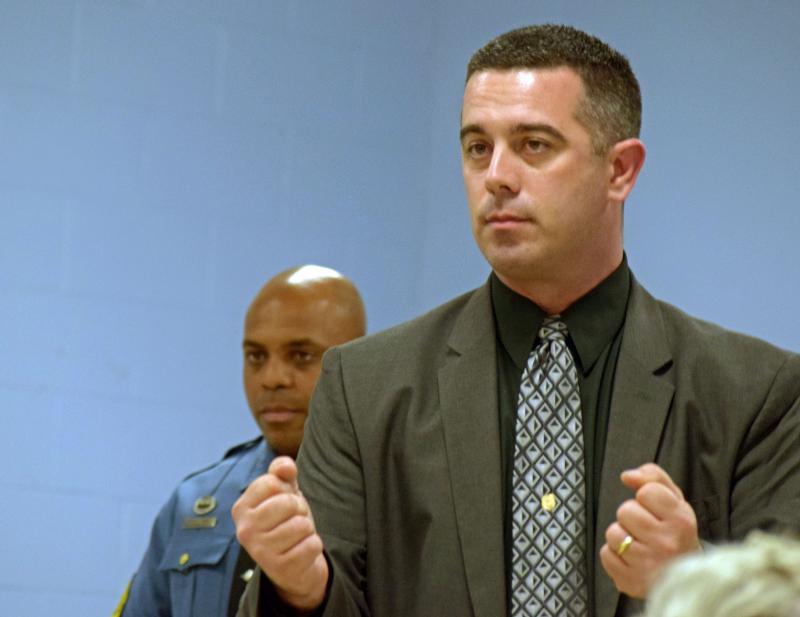As the heroin epidemic continues to claim lives across Delaware and the nation, Delaware State Police warn that drug-related crimes are on the rise - but they can be deterred with common sense precautions.
Sgt. Adam Wright said at a recent community meeting held in Lincoln that burglaries are increasing in Sussex County.
“That is a huge thing in Sussex County right now: burglaries. Burglaries, burglaries, burglaries,” he said.
Those statistics can be slightly misleading, though, Wright said, because many incidents were thefts from vehicles or sheds, not home invasions.
“It's the path of least resistance – nobody lives in a shed,” Wright said. Wright and other troopers said people driven to crime by drugs are not executing well-thought-out plans; they're looking for easy ways to steal from cars or unlocked sheds.
Heroin-related arrests
Sussex County
2010: 28
2011: 39
2012: 304
2013: 518
2014: 806
2015: 763
Statewide
2010: 808
2011: 898
2012: 1,497
2013: 2,535
2014: 3,066
2015: 2,981
Top 5 zip codes for arrests in 2015
19720 (New Castle): 328
19805 (Wilmington: Elsmere): 236
19973 (Seaford): 236
19901 (Dover): 233
19702 (Newark): 181
Source: Delaware State Police
“They do not want resistance,” he said. “If a car is locked, they'll move to the next one. I'm not going to say there will be no windows that get busted out. It may happen. But the chances are less because they don't want the alarms going off, the lights going off, the dogs barking, people turning on lights.”
Heroin-related arrests across the state have steadily increased from 2010 to 2015, Delaware State Police statistics show. In 2010, there were just over 800 reported arrests; in 2015, there were 2,981. In Sussex County, heroin-related arrests have jumped from 28 in 2010 to 763 in 2015.
Of 243 recently reported vehicle break-ins in Sussex County, every single vehicle was unlocked, police said. And since the beginning of the year, about 10 firearms have been stolen from unsecured vehicles in Sussex County, Wright said.
State police offer safety tips
- Lock doors, cars and windows
- Make sure properties are well-lit
- Install security systems
- Secure ladders
- Make house look lived in: Bring in trash cans, plow snow, cut grass
- Participate in a neighborhood watch program
Increased drug-related crime has driven state police to encourage residents to take precautions. Simple suggestions such as making sure doors are locked, ladders are secured, windows are closed and homes looked lived in are all ways to deter a criminal looking for an easy opportunity, officers said.
A map of overdose responses for Sussex County Emergency Medical Services in 2015 shows that no town in Sussex is completely untouched by the heroin epidemic. People are overdosing throughout Sussex County, with clusters of high activity in Seaford, Millsboro and Oak Orchard.
“Heroin, it's growing,” said Sussex County EMS Director Robert Stuart. “It isn't related to one side of the county versus the other. Yeah, it's heaviest in Seaford, but there are pockets spread all over the county.”
Stuart said county paramedics have seen a drastic increase in calls, driven partially by a growing population that includes many retirees, but driven in part by rising overdose rates. Sussex EMS responded to about 22,000 calls last year, a nearly 200 percent increase from an average 12,000 responses in 2010.
“The number of patients has gone up about 500 percent in the last 15 years,” he said. “Right now, heroin is a significantly growing problem in Sussex County. We have to figure out as a community, as a society, how we can fix this problem. I don't have the magic answer for that.”
Community leaders host summit to examine solutions
Concerns about the growing heroin epidemic were echoed at a Communities That Care Summit last month in Georgetown attended by law enforcement, health professionals, community advocates and state leaders.
Sgt. Ken Watson with the Delaware National Guard Counter-Drug Task Force said that while heroin is the second most prevalent drug in the state, it's definitely the top threat.
Statewide, heroin-related charges have quadrupled in the past five years, while in Sussex County, heroin-related crime has increased more than 20 times in that same time frame. More than 200 people died from heroin-related overdoses in 2015, Watson said.
“This stuff is everywhere,” Watson said. “It's coming in from all sides.”
Watson noted an 8 percent decline in charges from 2014 to 2015, but state Attorney General Matt Denn said that doesn't necessarily mean things are getting better.
“It's at an unacceptably high level,” he said, adding Delaware's small population means slight declines are not statistically significant. “As far as the violent crime and property crime that we see in the state, a significant percentage of it is driven by drug trafficking.”
The summit included three discussion panels on proposed and recently adopted legislation addressing the heroin epidemic and opiate abuse, a treatment and resources panel that looked at existing and needed services for addicts and a family support panel that provided information about resources for families with loved ones who are addicted.
Peggy Geisler, executive director of Sussex County Health Coalition and one of the event organizers, said the summit aimed to develop unified solutions across different community sectors to address the epidemic.
“This unifies people around common goals," she said. "At the same time, it allowed the opportunity to be creative, to think about what's available and what's not available.”
Geisler said prevention is the biggest missing link in communities, especially in Sussex County, which needs more services that provide intervention and support.
“This starts the dialogue,” she said.
For more information about how the heroin epidemic is affecting southern Delaware, check out our three-part series on heroin in Sussex County at tinyurl.com/ze83kco.




















































